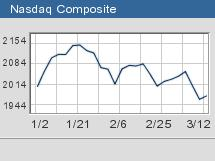NEW YORK (CNN/Money) -
Tech stocks enjoyed a nice rally Friday, with the Nasdaq rising more than 2 percent. But there was a sense on Wall Street that this may be just a pause before another round of selling, and not the end of a long overdue correction.
Before Friday, the Nasdaq had lost 5.4 percent in the prior five trading days. It was even worse for some specific tech sectors. The Philadelphia Semiconductor Index fell nearly 7 percent and the Amex Network Index dropped more than 8 percent.

Clearly, investors have been in a negative mood. Techs sold off despite some fairly decent news, beginning with Intel's mid-quarter update last week. Although Intel (INTC: Research, Estimates) slightly lowered the range of its sales guidance, the company is still expecting first quarter revenues to be 20 percent higher than a year ago.
Texas Instruments (TXN: Research, Estimates) raised the low end of its mid-quarter guidance. National Semiconductor (NSM: Research, Estimates) posted a better than expected profit. And software giant Oracle (ORCL: Research, Estimates) reported its second consecutive quarter of strong sales and earnings growth.
"Sentiment has not followed the fundamentals. There has been an air of caution," said Ozan Akcin, chief market strategist with Puglisi & Co.
| More about tech
|

|
|
|
|
To be sure, the near-term growth prospects for many tech companies still appear pretty bright. According to Thomson First Call, analysts are predicting a more than 40 percent year-over-year rise in first quarter profits for S&P 500 technology companies.
(This figure excludes Lucent, which skews results since it is expected to post a slight profit, compared to a big loss in last year's first quarter.)
But David Joy, vice president of capital markets strategy with American Express Financial Advisors, said weak economic numbers, particularly on the job front, have overshadowed the news from tech companies.
That has hurt tech stocks since sales and earnings growth for this year is largely predicated on the hope that there will be a pickup in corporate spending. "There is this creeping skepticism about the underlying strength of the economy," Joy said.
The beginning of some rotation?
Investors also have to put the Nasdaq's recent losing streak into context. The composite surged 50 percent last year and momentum continued heading into 2004. At its peak in late January, the Nasdaq was up 7 percent for the year.
One large growth fund manager said that even with the recent dip, strong fundamentals for tech might be factored into stock prices. "A lot of the tech companies that have done quite well and had higher multiples were ready to pullback," said John Thompson, manager of the Thompson Plumb Growth fund.
To that end, the S&P 500 technology sector is currently trading at 26 times this years' earnings estimates, a nearly 45 percent premium to the overall market.
Thompson said that given how cyclical the tech sector is, he doesn't think techs deserve that big of a premium. He added that back in the mid 90's, some tech stocks he owned, such as storage company EMC (EMC: Research, Estimates) and chip firm Linear Technology (LLTC: Research, Estimates) traded at price-to-earnings ratios that were more in line with the market. Now they both trade at about 40 times 2004 earnings estimates.
As a result, Thompson said his fund has relatively little tech exposure, with positions in Microsoft (MSFT: Research, Estimates), Hewlett-Packard (HPQ: Research, Estimates) and Oracle. He said he's been increasing his stakes in consumer staples and media instead of loading up on tech.
| More about the markets
|

|
|
|
|
Kent Mergler, president of Northstar Capital Management, which runs the Fremont Large Cap Growth fund, agreed that some so-called sector rotation may be occurring now.
Mergler owns several of the largest companies in the tech sector, including Cisco Systems (CSCO: Research, Estimates), Microsoft and Dell (DELL: Research, Estimates). But he said he's not looking to increase his position in any of these stocks, adding that other areas of the market are more attractive.
"The strongest segments of the market are healthcare, financials and consumer discretionary. We do think there's more upside there," Mergler said.
Be selective
Still, there are some who think that not all tech stocks will continue to fall.
Knox Fuqua, manager of the AAM Equity fund, said the recent weakness in tech stocks has created an opportunity to buy shares of some of the more solid tech companies. He said he's bought more shares of Cisco and Dell in recent weeks. But he thinks selectivity is key and is not expecting a major comeback in the sector. He adds that he has also been making bigger bets on consumer cyclicals and healthcare.
"The big tech stocks are still where you have to be but I don't want to go overweight tech," Fuqua said.
Bob Straus, manager of the Icon Information Technology fund, agreed that investors should not make broad technology bets. He said semiconductor equipment stocks look overvalued and that he's neutral on most chip companies, for example.
But stocks such as gaming software publisher Activision (ATVI: Research, Estimates), technology distributor Ingram Micro (IM: Research, Estimates) and wireless equipment firm SpectraLink (SLNK: Research, Estimates) are all reasonably valued and have strong fundamentals, Straus said.
Overall, techs will probably continue to remain volatile. Akcin said he wouldn't be surprised if techs did reasonably well in the next few weeks, leading up to first quarter earnings reports. But he said another tech stock drop was likely once the earnings actually come out -- the proverbial selling on the news -- and that a move into more defensive sectors could continue after that.
"Investors are edgy and nervous. That tends to mark the beginnings of rotation," Akcin said.

|

